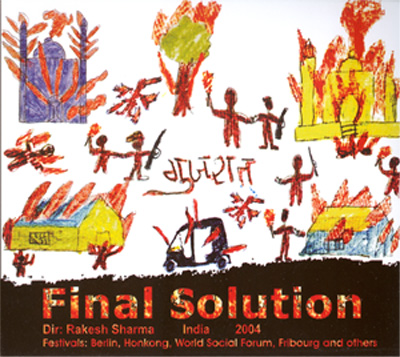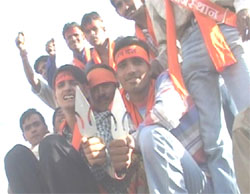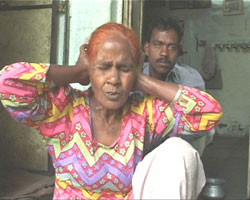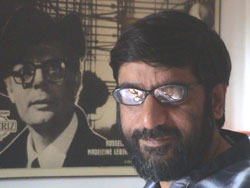
Final Solution
is a study of the politics of hate. Set in Gujarat during the period
Feb/March
2002 - July 2003, the film graphically documents
the changing face of right-wing politics in India through a study of
the 2002 genocide of Moslems in Gujarat. It specifically examines political
tendencies reminiscient of the Nazi Germany of early/mid-1930s. Final
Solution is anti-hate/ violence as “those who forget history are
condemned to relive it”.
Director's Statement
Post-911, we live in a world where politics of hate and intolerance has gained mainstream acceptance, even grabbed centrestage. The right-wing seems to be tightening its stranglehold across Europe and USA, a nationalism being fuelled by the anti-immigrant/anti-Moslem rhetoric. The ‘War on Terror’ dominated the electoral discourse in the US presidential elections, with both candidates promising to hunt ‘em and kill ‘em better than the other. In a world where it has become legitimate to use fictitious intelligence to justify the bombing of innocents in Iraq, where it has become acceptable to launch precision bombs and rockets against non-“embedded” journalists, where shameless politicians divide up oil wells and farm out reconstruction contracts for their $ 36 million bonuses, where babies are killed and mutilated as acceptable “collateral damage”, where suicide bombers and terror attacks claim hundreds of innocent lives, we face a challenge greater than ever before.
We have earlier lived through many dark periods in history, often justifying
our barbarism by using similar rhetoric. Hate, despair, destruction and
tragedy can not possibly help create harmonious societies and a democratic
world.
During the making of this film, I noticed shocking parallels between
India 2002-2004 and Germany of the 1930s - State-supported genocidal
violence against Moslems in Gujarat and its continuing impact – segregation
in schools, ghettoisation in cities and villages, formal calls for economic
boycott of Moslems and attacks on intelligentsia by right-wing Hindutva
cadres.
Unchecked and unchallenged, the rapid rise of politics of hate and
intolerance could very well be the forerunner of a 21st century
Endlosung – the
Final Solution.
More about the Film
 Part
1: Pride and Genocide deals with the carnage and its immediate
aftermath. It examines the patterns of pre-planned genocidal violence
(by right-wing Hindutva cadres), which many claim was state-supported,
if not state-sponsored. The film reconstructs through eyewitness
accounts the attack on Gulbarg and Patiya (Ahmedabad) and acts of
barbaric violence against Moslem women at Eral and Delol/Kalol (Panchmahals)
even as Chief Minister Modi traverses the state on his Gaurav Yatra.
Part
1: Pride and Genocide deals with the carnage and its immediate
aftermath. It examines the patterns of pre-planned genocidal violence
(by right-wing Hindutva cadres), which many claim was state-supported,
if not state-sponsored. The film reconstructs through eyewitness
accounts the attack on Gulbarg and Patiya (Ahmedabad) and acts of
barbaric violence against Moslem women at Eral and Delol/Kalol (Panchmahals)
even as Chief Minister Modi traverses the state on his Gaurav Yatra.
 Part
2 : The Hate Mandate documents the poll campaign during
the Assembly elections in Gujarat in late 2002. It records in detail
the exploitation of the Godhra incident by the right-wing propaganda
machinery for electoral gains. The film studies and documents the
situation months after the elections to find shocking faultlines – voluntary
ghettoisation, segregation in schools, formal calls for economic
boycott of Moslems and continuing acts of violence.
Part
2 : The Hate Mandate documents the poll campaign during
the Assembly elections in Gujarat in late 2002. It records in detail
the exploitation of the Godhra incident by the right-wing propaganda
machinery for electoral gains. The film studies and documents the
situation months after the elections to find shocking faultlines – voluntary
ghettoisation, segregation in schools, formal calls for economic
boycott of Moslems and continuing acts of violence.
Final Solution was banned in India by the Censor Board for several months. The ban was lifted in Oct.'04 after a sustained campaign (an online petition, hundreds of protest screenings countrywide, multi-city signature campaigns and dozens of letters to the Government sent by audiences directly).
A Pirate-and-Circulate campaign was conducted in protest against the ban (Get-a-free-copy-only-if-you-promise-to-pirate-and-make-5-copies). Over 10,000 free Video CDs of the film were distributed in India during this campaign, which ended in Dec. 2004. Final Solution was offered free to Anhad for their campaigns; it was included in their anthology titled "In defence of our dreams". Subscribers of several journals/mags also got a copy of the film free of cost. These included Communalism Combat (Ed : Teesta Setalvad and Javed Anand), Samayik Varta (Ed : Yogendra Yadav), Janmat and several smaller journals.
Final Solution was rejected by the government-run Mumbai International Film Festival, but was screened at Vikalp: Films for Freedom (http://www.freedomfilmsindia.org), organised by the Campaign Against Censorship. Rakesh Sharma has been an active member of the Campaign since its inception.
Rakesh has been working on distribution of the film on a full-time basis since March 2004. Formally, about 21,000 video CDs and 4,000 DVDs of the film have been distributed. Informal circulation estimates ( post the pirate-and-circulate campaign) put the number somewhere between 40,000 to 100,000 copies. The film is now being dubbed in Gujarati, Hindi, Kannada and Tamil. An additional 25,000 video CDs of the language versions are expected to be released soon.
The film has been screened on BBC, NHK, DR2, YLE and several other channels. It is yet to be shown on Indian television.
Wolfgang Staudte award & Special Jury Award (Netpac), Berlin International film festival (2004)
Humanitarian Award for Outstanding Documentary, HongKong International film festival (2004)
Montgolfiere d’Or (Best Documentary) & Le Prix Fip/Pil’ du Public
(Audience award), Festival des 3 Continents at Nantes (France;
2004)
Best Film, Freedom of Expression awards by Index on Censorship (UK; 2005)
Silver Dhow, Zanzibar International film festival (2004)
Best documentary, Big MiniDV (USA; 2004)
Special Jury Award, Karafest (Karachi; 2004)
Special Jury Award, Film South Asia (Kathmandu; 2005)
Human Rights Award, Docupolis (Barcelona; 2005)
Special Jury Mention, Munich Dokfest (2004)
Special Jury Mention, Bangkok International filmfest (2005)
Nominee, Best Foreign Film, Grierson Awards (UK; 2004)
Best Documentary/Short Film, Apsara Awards(India;2006)
Special Award by NRIs for a Secular and Harmonious India (NRI-SAHI), NY-NJ, USA (2004)
Special Award by AFMI, USA-Canada (2004)
Special Jury Award, Worldfest 2005 (Houston)
Special Jury Award, Mar Del Plata Independent film festival (2005; Argentina)
Screened at over 80 international film festivals.
 Rakesh
Sharma began his film/TV career in 1986 as an assistant
director on Shyam Benegal's Discovery of India. His broadcast industry
experience includes the set up/ launch of 3 broadcast channels in
India: Channel [V], Star Plus and Vijay TV.
He has now gone back to independent documentary film-making.
Rakesh
Sharma began his film/TV career in 1986 as an assistant
director on Shyam Benegal's Discovery of India. His broadcast industry
experience includes the set up/ launch of 3 broadcast channels in
India: Channel [V], Star Plus and Vijay TV.
He has now gone back to independent documentary film-making.
His first independent film Aftershocks: The Rough Guide to Democracy won the Best documentary film award at Fribourg, Big Mini-DV and Jeevika (India) and won 8 other awards (including the Robert Flaherty prize) at various festivals in USA and Europe during 2002-03. It has been screened at over 100 international film festivals.
Both
Final Solution and Aftershocks were rejected by the government-run
Mumbai International filmfest (MIFF) in 2004 and 2002 respectively.
Press
Interview
with Rakesh Sharma
Berlinale Catalogue
"Post-Godhra,
hate still threatens: Filmmaker"
Hindustan Times, Apr 15, 2004
"Indian
movie shines at Hong Kong festival"
Times of India, Apr 15, 2004
"Polling
strings"
Shanta Gokhale, Mid-Day, Feb 17, 2004
"A
miss at MIFF, accolades at Berlinale"
Kalpana Sharma, The Hindu, Feb 17, 2004
"Mumbai
reject finally shines in Berlin"
Times of India, Feb 17, 2004
"Rakesh
Sharma's film wins accolades at Berlin film fest"
IndianTelevision, Feb 16, 2004
"Women
from minority community still traumatised"
Piali Banerjee, Times of India, Dec 16, 2003
"The
ride is less bumpy"
Shubhra Gupta, Sep 29, 2003, The Hindu Business Line
Print Downloads
Synopsis (PDF)
Press Blurbs (PDF)